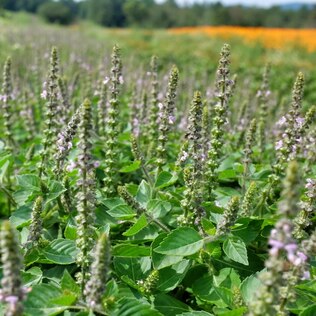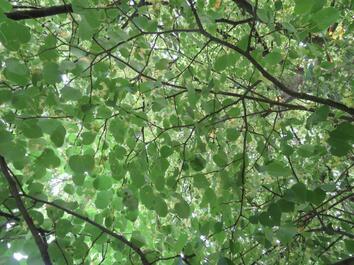 Tulsi at Foster Farm Botanicals, VT Tulsi at Foster Farm Botanicals, VT A nervine is a term used to describe a broad category of plant actions that have an effect on the nervous system. Nervines help to restore, balance, and bring ease to our nervous system. Depending on the individual, nervines may be used to calm and focus, uplift and move, relax and unwind, or bring ease to the mind and heart. Subcategories of nervines There are three major subcategories of nervines: nervine tonics, relaxing nervines, and stimulating nervines. As with any category of herbal actions (i.e. adaptogen, bitter, nootropic, immune stimulant, etc.) plants can be further characterized by defining their qualities such as aromatic, warming, and moistening. Although beyond the scope of this article, a sense of these characteristics is helpful to identify which herbs will be most helpful for a particular person and situation.  Linden tree Linden tree The nervous system reaches–or innervates (literally, “to supply with nerves”)-all parts of our body. When we support the nervous system with nervines we, in turn, also support other functions in the body, such as digestion, immunity, cardiovascular health, and adrenal health. This is why nervine herbs are used in far more formulas than ones primarily designed to support the mind and heart. This is a perfect example of how in herbalism, a person is viewed holistically. It is never “just the mind and heart.” The mind and emotional heart imbue and influence every part of the body. Now, let’s dive into the three major categories of nervine herbs… Nervine tonic A nervine tonic is an herb that broadly supports nervous system function and integrity. These tonic herbs strengthen and nourish the nervous system, and are helpful when a person’s nervous system has been heavily taxed. Often taken daily for extended periods, nervine tonics help to restore and replenish a healthy nervous system. Some favorite nervine tonics are skullcap, milky oats, and St. John’s wort. Nervine relaxant A nervine relaxant is an herb that helps to bring a sense of calm into a person’s perception. These herbs can be supportive any time of day, whether to soothe nerves that may upset the digestive tract, calm a scattered mind mid-day, or to ease into rest and recuperation at the end of the day. These herbs can be used in the moment to support occasional stress or anxiety. There are so many wonderful nervine relaxants to choose from, so it can be helpful to consider the energetics of the herbs when selecting which might be right for a person or situation. Some examples include:
Nervine Stimulant A nervine stimulant is an herb that brings excitement and stimulation to the nervous system. This can be especially helpful for occasional sluggishness or a tendency towards lower-than-desired-function in body or mind. Some of the best known and most widely consumed herbs in the world are nervine stimulants, such as Camellia sinensis (tea plant), Coffea species (coffee), and Theobroma cacao (chocolate). While these all contain caffeine and are quite strong stimulants, there are other herbal nervine stimulants that can promote gentle alertness, such as rhodiola, tulsi, and rosemary. Putting it together The information above is a basic guide to understand the nervine action and its nuances, but it is important not to get hung up on the categorization of the herbs. Each herb is complex- just like humans! Herbs carry a range of effects and have affinities for various body systems. Blending a nervine relaxant with a nervine stimulant or a nervine tonic often creates a balancing blend that takes into account the broadness of human experience by supporting various areas of body, emotion, and mind. To illustrate this point, let’s consider a person with significant muscular tension due to occasional stress who may feel tired or have difficulty focusing because of the energy it takes for them to continue holding tension in their body. In this case, they may benefit from a relaxing nervine that can help liberate stuck energy and improve outlook. A relaxing nervine might have the desired invigorating effect for this person, rather than a stimulating plant which could cause even more tension. Related categories Beyond these basic categories of nervine herbs, there are more specific categories of nervine herbs, such as:
Get support If you want help choosing which nervines may be most appropriate for you, reach out to one of our clinically-trained herbalists to get individualized recommendations. Originally written by Susan Staley 10/13/2020. Updated by Jennifer Porter 3/19/2024.
5 Comments
Kim
10/14/2020 04:23:38 pm
So we'll written, thanks for sharing this information!
Reply
Kim
10/14/2020 04:24:22 pm
WELL WRITTEN. robot problems sorry.
Reply
Nick
3/22/2021 06:34:21 am
Thank you for sharing! :) 3/18/2021 11:39:12 pm
Hi, thank you for such a brilliant post. I have been reading some blogs that gives me more knowledge about what is a nervine anyway; I must say this is one of the best among them. You have done a great research for I feel, thanks for sharing.
Reply
Nick
3/22/2021 06:33:34 am
Thank you!!
Reply
Leave a Reply. |
Details
RAILYARDCheck in here to keep updated on news and activities at the apothecary. Archives
April 2024
Categories
All
|
railyard apothecary
*These statements have not been evaluated by the Food and Drug Administration. This product is not intended to diagnose, treat, cure, or prevent any disease. For educational purposes only.
|
|


 RSS Feed
RSS Feed
